Dibyajyoti Sarma's Blog, page 44
January 26, 2015
The view of the busy street, with the evening traffic bel...
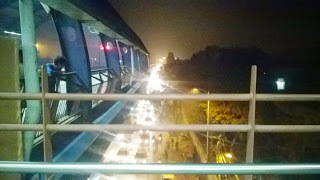 The view of the busy street, with the evening traffic below, and above, the Metro platform… Halfway through reaching Rajendra Nagar Metro Station, on a regular Saturday evening...
The view of the busy street, with the evening traffic below, and above, the Metro platform… Halfway through reaching Rajendra Nagar Metro Station, on a regular Saturday evening...
Published on January 26, 2015 14:19
There was a time, in the not-so-distant past, when photog...
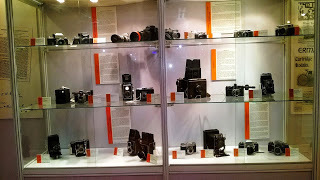 There was a time, in the not-so-distant past, when photography was about film rolls. You could click just 32 photographs at one time (33-34 clicks if you are lucky). You did not have the chance to review the pictures, until you sent the roll to the dark room to be developed, and you received the prints, either in gloss or matte papers. Then, digital cameras were invented, and everything changed. Now, you could click insane amount of pictures at one time, and also, review your photographs real time. You did not need prints to see your pictures. With the coming of smartphones, the act of taking pictures took another dramatic turn. Selfie became a legitimate word in our language, and taking pictures, selfie or otherwise, became the national pastime. Today, you no longer print photographs. You upload them on Facebook, and if you fancy yourself as a photographer, then on photo upload sites like Instagram and Flikr.
There was a time, in the not-so-distant past, when photography was about film rolls. You could click just 32 photographs at one time (33-34 clicks if you are lucky). You did not have the chance to review the pictures, until you sent the roll to the dark room to be developed, and you received the prints, either in gloss or matte papers. Then, digital cameras were invented, and everything changed. Now, you could click insane amount of pictures at one time, and also, review your photographs real time. You did not need prints to see your pictures. With the coming of smartphones, the act of taking pictures took another dramatic turn. Selfie became a legitimate word in our language, and taking pictures, selfie or otherwise, became the national pastime. Today, you no longer print photographs. You upload them on Facebook, and if you fancy yourself as a photographer, then on photo upload sites like Instagram and Flikr.Does this mean that photo printing as we knew it is dead? Yes and no. Photo printing is not dead. With the advent in technology, even photo printing has morphed into something else, a specialised service. Now, you don’t print pictures in 4x5 papers, you make a photobook, with vivid colours and various enhancements, which can make you look a million bucks. There are presses like the HP Indigo series, Xerox Versant and Scodix, which can help you achieve this. And there are service providers who will make you a photobook of your pictures the way you want it.
Talking about cameras, a shot of the Vintage Camera Museum, titled Museo Camera, curated by Aditya Arya, who displayed cameras collected from around the world, including some iconic cameras from the last 100 years, at the CEIF Photofair 2015, which was held in Pragati Maidan, New Delhi, from 8 to 11 January, 2015, organised by the All India Photographic Trade and Industry Association (AIPTIA) and co-organised by the Asian Imaging and Photography Magazine.
Published on January 26, 2015 14:16
Mutton Curry at Rajinder De Dhaba, a popular eatery in th...
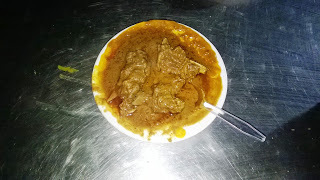 Mutton Curry at Rajinder De Dhaba, a popular eatery in the middle of posh Safdarjung Enclave in Delhi. And, the food, awesome.
Mutton Curry at Rajinder De Dhaba, a popular eatery in the middle of posh Safdarjung Enclave in Delhi. And, the food, awesome.
Published on January 26, 2015 14:15
Tea sets, tableware in Manipuri Black Stone Pottery, as s...
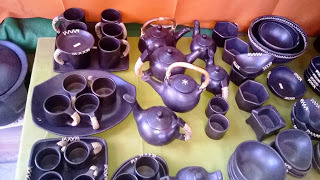 Tea sets, tableware in Manipuri Black Stone Pottery, as seen in the Dastakari crafts fair, at Andheria Mor, Delhi.
Tea sets, tableware in Manipuri Black Stone Pottery, as seen in the Dastakari crafts fair, at Andheria Mor, Delhi. The village of Longpi (or Loree) in Manipur is well-known for its age-old stone pottery art – Longpi Hamlei. The raw materials used are weathered rock and serpentine rock, which according to locals, are available at Longpi alone. The two rocks are crushed to a powder and mixed with water in a ratio of 5:3 to form a clay-like consistency. The dull-brown mixture is kneaded the entire day and flattened on a wooden board for the initial slab work. Uniquely, Longpi pots are not crafted on a potter’s wheel. Every item is shaped by hand with the help of molds and tools. Once the shaped clay has dried and is hard enough, it is taken to an open bonfire and heated for 5 to 7 hours at temperatures over 1200 degrees centigrade. The pottery is taken out when still hot and scrubbed with a local leaf known as the machee, giving it a smooth finish and nice shine. The final products are gray-black cooking pots and kettles, charming bowls, and mugs and trays, frequently accompanied with a lacing of fine cane at the handles and knobs. They have a distinctly earthy, yet contemporary appearance.
Almost every family in Longpi knows how to make black stone pottery, an art that is unique to this village. Whether they sell it or not, they do make the pots for their own use.
More Here/
Published on January 26, 2015 14:13
Gods for sale. For Rs 50 each. Outside the Janpath Market...
Published on January 26, 2015 14:12
January 20, 2015
Let There Be Translators!By Schulman, Grace And the Lord ...
Let There Be Translators!
By Schulman, Grace
And the Lord said, ‘‘Behold, the people is one and they have all one language… Go to, let us go down, and there confuse their language, that they may not understand one another’s speech.’’
Genesis XI: 6, 7.
When God confused our languages, he uttered,
in sapphire tones: ‘‘Let there be translators!’’
And there were conjurors and necromancers
and alchemists, but they did not suffice:
they turned trees into emeralds, pools to seas.
God spoke again: ‘‘Let there be carpenters
who fasten edges, caulk the seams, splice timbers.’’
They were good.
God said: ‘‘Blessed is the builder
who leaves his tower, turns from bricks and mortar
to marvel at the flames, the smith who fumbles
for prongs, wields andirons, and prods live coals,
who stokes the hearth and welds two irons as one.’’
Praised was the man who wrote his name in other
handwriting, who spoke in other tones,
who, knowing elms, imagined ceiba trees
and cypresses as though they were his own,
finding new music in each limitation.
Holy the one who lost his speech to others,
subdued his pen, resigned his failing sight
to change through fire’s change, until he saw
earth’s own fire, the radiant rock of words.
By Schulman, Grace
And the Lord said, ‘‘Behold, the people is one and they have all one language… Go to, let us go down, and there confuse their language, that they may not understand one another’s speech.’’
Genesis XI: 6, 7.
When God confused our languages, he uttered,
in sapphire tones: ‘‘Let there be translators!’’
And there were conjurors and necromancers
and alchemists, but they did not suffice:
they turned trees into emeralds, pools to seas.
God spoke again: ‘‘Let there be carpenters
who fasten edges, caulk the seams, splice timbers.’’
They were good.
God said: ‘‘Blessed is the builder
who leaves his tower, turns from bricks and mortar
to marvel at the flames, the smith who fumbles
for prongs, wields andirons, and prods live coals,
who stokes the hearth and welds two irons as one.’’
Praised was the man who wrote his name in other
handwriting, who spoke in other tones,
who, knowing elms, imagined ceiba trees
and cypresses as though they were his own,
finding new music in each limitation.
Holy the one who lost his speech to others,
subdued his pen, resigned his failing sight
to change through fire’s change, until he saw
earth’s own fire, the radiant rock of words.
Published on January 20, 2015 00:00
January 14, 2015
The Tragedy of Perumal Murugan
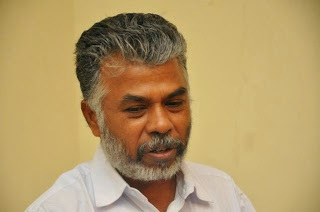 Following the uproar on Tamil writer Perumal Murugan’s writings, the author, on January 13, announced the most heart-breaking and most difficult statement a writer can ever make. “Perumal Murugan, the writer is dead. As he is no God, he is not going to resurrect himself. He also has no faith in rebirth. An ordinary teacher, he will live as P. Murugan. Leave him alone,” he posted on his Facebook account.
Following the uproar on Tamil writer Perumal Murugan’s writings, the author, on January 13, announced the most heart-breaking and most difficult statement a writer can ever make. “Perumal Murugan, the writer is dead. As he is no God, he is not going to resurrect himself. He also has no faith in rebirth. An ordinary teacher, he will live as P. Murugan. Leave him alone,” he posted on his Facebook account.This is at a time when every liberal in India is saying, ‘I am Charlie’, referring to the Charlie Hebdo shooting in Paris. The incident regarding Perumal demands no less indignation, especially at the face of right wing demands. It is a blot on India’s cultural diversity. It is a violation of the Constitution right to the Freedom of Speech.
Some people may argue that the author Murugan should not have retreated so easily, he should have fought back. I understand the hurt Murugan must have gone though, the hurt of being misunderstood. Perhaps, he also knew that it was a fruitless effort to try to make politically motivated zealots to see reason. Politics has its own way of telling the truth.
Yet, I must hope. No protests can stop a writer from writing. I am sure, despite the grand statement, Murugan will continue to write, in private, and someday perhaps, the country will recover, to read his words.
/
"I will pay the compensation for the unsold books," he said.
Hounded by Hindutva and caste outfits, writer Perumal Murugan, whose novel Madhorubhagan was under attack, announced his decision to give up writing altogether. “Perumal Murugan, the writer is dead. As he is no God, he is not going to resurrect himself. He also has no faith in rebirth. An ordinary teacher, he will live as P. Murugan. Leave him alone,” he has posted on his Facebook account.
Though he is not available for comment, his close friends said he was forced to take this extreme step after the going through agonising moments at the peace meeting held at Namakkal on Monday. He also urged his publishers — Kalachuvadu, Nattrinai, Adayalam, Malaigal and Kayalkavin — not to sell his novels, short stories, poetries and other creative works.
“I will pay the production cost and compensation for unsold books,” he said. “Those who have bought my books can consign them to the flames. I am also ready to pay compensation to them,” he said. He also called upon organisers of literary festivals not to invite him to any events. “As I have decided to withdrawn all books, I request caste outfits and religious organisation to desist from protests,” he said.
MORE HERE/
/THE UNFOLDING OF THE EVENTS/
/
Alleging that Tamil writer Perumal Murugan’s novel, Madhorubhagan, has portrayed the Kailasanathar temple in Tiruchengode and women devotees in bad light, the BJP, RSS and other Hindu outfits have demanded its ban and the arrest of the author. They burnt copies of the book on Friday at Tiruchengode.
The book has been translated and published in English as One Part Woman by Penguin India and it had seen two editions.
Mr. Murugan, an author of seven novels and a dictionary of dialects of the Kongu (western) region of Tamil Nadu, has filed a complaint with the Superintendent of Police seeking protection for him and his family members. “In the last 20 days, I have been receiving calls abusing me. It has disturbed me a lot. On Thursday, a group of people visited my house and wanted a copy of the book,” Mr. Murugan, who works as a Tamil Professor at the Government Arts College in Namakkal, told The Hindu.
Madhorubagan, Tamil equivalent of Ardhanareeswarar, the presiding deity of Tiruchengodu temple, revolves around childless couple Kali and his wife, Ponna. Their predicament is discussed in the backdrop of the “traditional free, consensual sex rituals” held once in a year during the car festival of the temple in the past. Kali resists attempts to make his wife to participate in the ritual, but in the end he is shattered when he finds her missing from home.
Kannan, publisher of Kalachuvadu, which had published the book in 2010, said though many communities were embarrassed by certain aspects of their history and culture that could not fit in with their present day middle class values, no creative writer could obey the dictums of ‘fascist forces.’ “Kalachuvadu will stand by Perumal Murugan. Tamil intellectuals must get together and face this challenge,” he said.
MORE HERE/
/
Political parties and writers have rallied behind Tamil writer Perumal Murugan, who is under attack from the BJP and other Hindu outfits, for what they call the denigration of Lord Shiva and women devotees in his novel Madhorubhagan. The Tamil Nadu Progressive Writers and Artistes Association (TNPWAA) on Saturday organised a demonstration here, in which senior writers participated to express solidarity with Mr. Murugan.
TNPWAA general secretary Su. Venkatesan and president Tamilselvan alleged that the Sangh Parivar had sought to turn people of a particular area against a writer, hailing from the region. “Any attack on creative works and authors will only turn the clock back. Madhorubhagan deals with human relations in the backdrop of an age-old practice in a part of Tamil Nadu. It cannot be construed as an insult to women or religion,” they said and alleged that these kind of activities were on the rise after the BJP assumed office at Centre.
While CPI(M) State secretary G. Ramakrishan spoke to Mr. Murugan and expressed solidarity, Viduthalai Chiruthaikal Katchi leader Thol. Thirumavalavan, in a statement, said the demand for a ban on the novel was part of a larger design of the Sangh Parivar to convert Tamil Nadu into a land of clashes. At a press conference, TNCC president EVKS Elangovan said: “Such actions violate the fundamental right of expression. Artistic right to express should not be stifled.”
Mr. Ramakrishnan wondered why the BJP and its offshoots wanted to ban a novel published in 2010. “No one can suppress the freedom of expression. I told Mr. Murugan that my party will stand by him,” he said. Alleging that the Sangh Parivar was emboldened to act as the cultural police after the BJP assumed power at the Centre, he urged the State government to provide adequate security for the writer and his family.
Mr. Thirumavalavan said the Sangh Parivar had no right to interfere with the creativity of a writer, who had portrayed a tradition that was in vogue many years ago.
MORE HERE/
/
Amid the controversy over Tamil writer Perumal Murugan’s novel Madhorubhagan , Hindutva ideologue and writer Aravindan Neelakantan has reiterated that the RSS had never favoured the idea of banning books. “Immediately after the ban on Salman Rushdie’s Satanic Verses, Shiv Sena demanded similar measure against Riddles in Hinduism and its removal from Dr Ambedkar’s collected works. But the RSS opposed the ban and wanted it to be published,” Mr Neelakantan said. Accusing the media of blowing out of proportion the activities of a few fringe elements in Tiruchengode, he said RSS had nothing to do with this incident.
Expressing concern over the incident, TNPWAA general secretary Su. Venkatesan and president Tamilselvan alleged that the Sangh Parivar had sought to turn people of a particular area against a writer, hailing from the region. “Any attack on creative works and authors will only turn the clock back. Madhorubhagan deals with human relations in the backdrop of an age-old practice in a part of Tamil Nadu. It cannot be construed as an insult to women or religion,” they said and alleged that these kind of activities were on the rise after the BJP assumed office at Centre.
In his novel, Mr. Murugan had portrayed the life of guilt-driven childless couple in the backdrop of a “free-sexual ritual” held during the car festival of Arthanareeswarar temple in Tiruchengode.
MORE HERE/
/
The controversy over the book, Madhorubhagan , written by Perumal Murugan, was solved on Monday after over four hours of negotiations at the Collectorate here. A peace agreement was signed by Mr. Murugan and various members of Hindu outfits late on Monday night.
According to V.R. Subbulakshmi, District Revenue Officer, who chaired the meeting, the writer had agreed to issue an unconditional apology, delete controversial portions in the book, withdraw unsold copies from the market and not to write on controversial subjects hurting sentiments of people.
The Hindu outfits agreed to withdraw from all forms of protests with immediate effect. Both parties decided not to press for FIRs on complaints against each other. Commotion prevailed at the Collectorate’s entrance even before the commencement of the meeting at 4.30 p.m. on Monday, when police refused to allow over a hundred members of various Hindu outfits to participate in the meeting.
The protesters demanded that all those assembled be allowed for the meeting. But, the police agreed to allow only 30 representatives . The DRO held separate meetings with the 30-member team and also with Perumal Murugan, who had come to the meeting alone with police protection. R. Suman, Revenue Divisional Officer, Tiruchengode, and Ramasamy, Deputy Superintendent of Police, assisted the DRO at the meeting. According to sources close to Mr. Murugan, he had told his supporters that he would participate in the meeting on his own and they need not accompany him. Mr. Murugan has been provided with police protection for the past few days following the controversy.
MORE HERE/
/
THE ISSUE/
/
It is this great literary chronicler who is now virtually banished from his beloved Kongu region. On the night of January 8, on the pointed advice of the police, Perumal Murugan fled his hometown with his family. A day later, Tiruchengode town observed a total shutdown protesting his novel, “Mathorubhagan.” This came after weeks of abusive and threatening phone calls. Earlier, on December 26, an illegal assembly of people burnt copies of his book, demanded a ban on the book and the arrest of its author and its publisher.
“Mathorubhagan” was published four years ago. The novel marks the second phase of Mr. Murugan’s fictional explorations. It poignantly tells the story of a childless peasant couple set in a time about a century ago. Ponna and Kali rejoice in their conjugal love but their pain of being childless is accentuated by the taunts of neighbours and insults on religious functions. Tiruchengode, the abode of Siva in the form of half-woman half-man, is the sacred temple to which childless couple flock to this day hoping to extend their lineage. Over 125 years ago, Chinnathayammal and Venkata Naicker of Erode circumambulated the “varadi kal” at Tiruchengode resulting in the birth of the great rationalist, Periyar.
After exhausting all means, childless couples seek what is, from a modern perspective, an exotic, even ‘immoral,’ solution. Every year, at the Vaikasi Visakam car festival, childless women indulge in consensual sex in a carnivalesque atmosphere. The lucky are able to conceive. Children born of this socially sanctioned ritual are referred to as sami kodutha pillai (god-given children). Any anthropologist would attest to similar practices existing in many pre-modern societies with no access to assisted conceptions. Classical Hindu traditions refer to this practice as niyoga or niyoga dharma — an indication of its religious sanction. It is this section of the novel that has provoked the ire of Hindu fundamentalists and caste purists. Portrayed as a slur on Hindu women, Mr. Murugan is being pilloried for denigrating the whole town. The Sangh Parivar, seeking a toehold in Tamil Nadu, sensed an opportunity. A local Rashtriya Swayamsevak Sangh functionary was in the forefront of the assembly that burnt the book. After the state leadership disowned responsibility, Hindu outfits are now working from behind the scenes. Over the last few weeks, thousands of the supposedly offending pages, ripped out of context, have been reprinted and distributed to devotees. One would have thought revering books rather than burning them was Hindu tradition.
Provocative posters have been plastered all over the town. Reports indicate that violent views have been expressed in unauthorised meetings. In a desperate bid to avert disturbance to everyday life, Mr. Murugan issued a pained clarification, even offering to delete all references to the town in subsequent editions. But to no avail. A complete bandh was enforced.
For four years nobody was offended. In fact, discerning readers identified themselves with Ponna and Kali. The novel has a fuzzy end and readers badgered Mr. Murugan with questions on Kali’s fate. He responded creatively — with one, no, two sequels following different trajectories — “Alavayan” and “Ardhanari.”
Evidently the advocates of burning books do not understand literature. And in a worrying scenario they have been joined by other sinister interests. Mr. Murugan is not only a novelist; he has been teaching in government colleges for two decades now. Over the years he has written scathing essays on the business of education. Namakkal specialises in two forms of poultry farming: hatcheries produce chicken and eggs while schools churn out high-scoring students. Mr. Murugan has pulled no punches in exposing the many unethical, even illegal, practices of such factory-schools. He has written in support of U. Sahayam, the crusading bureaucrat, who brought many environmental culprits to book during his term as Salem collector. The whole gamut of local vested interests has joined hands and, at least temporarily, succeeded in making him a fugitive.
MORE HERE/
/AUTHORSPEAK/
/
Perumal Murugan spoke to B. Kolappan about the controversy surrounding his book and the local protests that have forced him to flee his native town./
Why is there a sudden protest against the novel?
I have no idea. The English translation of the novel is probably the reason. It was published in 2014 and someone who read it could have instigated the local organisations.
Are only Hindutva organisations behind the protests?
I think, for the first time, caste organisations and Hindu organisations have come together on the same platform. The Hindu Munnani and three other caste organisations are running the campaign. Their objective has nothing to do with the book, since they are not ready to relent even after I promised to change the name of the village in the next edition of the book. After I issued a clarification, the local police officials arranged a meeting with the four organisations to find a compromise. I waited, along with the Revenue Development Officer. But none of those who objected to the book turned up.
Why are caste outfits involved in this?
Caste organisations and so-called educationists, who are running schools in Namakkal and Tiruchengode areas that specialise in rote-learning and deny students sporting activities, have been looking for an opportunity to settle score with me as I have been constantly writing against the education system and caste practices. I have also compiled a collection of 32 articles by my students, who had borne the brunt of casteism, in “Saathiyum Naanum.” I have dedicated my latest novel “Pookuli” to Dharmapuri Ilavarsan, a victim of casteism. People refused to buy the novel after seeing my dedication to the book.
Did you not realise that the theme of the novel and making references to a community could land you in trouble?
Our society is steeped in casteism; how can a writer and his writings remain aloof? I have used the word Gounder. But there are so many communities that bear the title. I have avoided referring to any community in “Pookuli.”
Is there any documentary evidence to support the existence of consensual sex, written about in the book?
There is no historical evidence. Details about the custom were passed on orally. Writer Theodore Baskaran and Professor A.K. Perumal have also written about similar customs that prevailed in other parts of the State. For example, [there is] the Thuppatti festival in which men and women participate while covering their faces.
MORE HERE/
/
Namakkal-based author Perumal Murugan talks to Akila Kannadasan on his novel Madhorubhagan that is in the eye of a storm/
How is your mindset at present?
It has been four years since this work came out; it was well-received and got a lot of good reviews. Its English translation did well too. When its copies were burnt, I wondered if there was any point in writing for such a society; one that sets fire to a book without the slightest understanding of what litterateurs had to say about it. But the campaign for freedom of speech and the support from the media and readers that Madhorubhagan triggered altered my frame of mind.
Will the intolerance shown to the book affect your writing in any way?
I feel this incident will affect my writing. There are chances of my mind going into self-inspection even as I write. I wonder if I can think independently. This was perhaps the intention of the opposing forces. I hence have to start writing again only once I’m completely out of this mindset. I will have to fight hard to get back to writing with a free mind in order to defeat the purposes of those who oppose my writing.
Your comments on creative freedom in India.
The law provides for us to write and speak our mind — this is our right. But often religious and casteist forces tend to subvert this. We, at present, are in a situation to fight these forces at various levels.
Tell us about how Madhorubhagan came about. What was the inspiration behind titling it after the chief deity of Tiruchengode temple?
Infertility has been a problem in society since time immemorial. I’ve seen couples around me suffer due to the inability to have a child and decided to write on this. In the course of my research, I came across a societal practice that existed in the past to deal with childlessness. My mind began to weave these two themes. The more I delved into the minds of such couples, the more I got to understand them — their despair and fear, and the intimacy and the depth of the love they share. The fascinating form of Madhorubhagan of Lord Shiva tells of how man and woman should be given an equal stand in everything. This aspect was the inspiration behind naming my novel.
Madhorubhagan talks about consensual sex rituals that were in existence in the past. Do you think people of the time were liberal when it came to sex?
We shouldn’t label the ways of the past as forward or backward by the social boundaries of today. It’s important that we understand the societal norms of that time. We shouldn’t look down on the beliefs of the past nor look up to them with the eyes of the present. We must approach these stories bearing in mind that these practices were accepted by society then.
Tell us about your childhood in Tiruchengode. Was the temple and its history a constant presence in your life?
I know the Thiruchengode of the 1960s very well. My mother’s job was to draw water from a pond called ‘Malarkuttai’ at one side of the hill and supply it to various shops. Through her, I came to know the town well. I can vividly recall how she called a place ‘Anju lantern mukku’ — ‘The five lantern corner’. She shaped my understanding of the place. During holidays, I sold soda and cool drinks in a mandapam on the hill. This way, I made friends with the mendicants and the holy men; they were affectionate people. The temple formed an important part of my childhood.
Are you a teacher who likes to write or a writer who likes to teach?
I am a writer first. I started teaching since I couldn’t make a living out of writing. Writing is my jeevan (life). Teaching is my jeevanam (bread and butter).
MORE HERE/
Published on January 14, 2015 03:02
January 12, 2015
The Legend of Korra
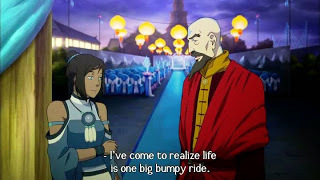 “I have come to realize life is one big bumpy ride,” says the airbending master Tenzin to Avatar Korra at the end of the season four of The Legend of Korra. The legend ends.
“I have come to realize life is one big bumpy ride,” says the airbending master Tenzin to Avatar Korra at the end of the season four of The Legend of Korra. The legend ends.
Published on January 12, 2015 23:15
The Bubble
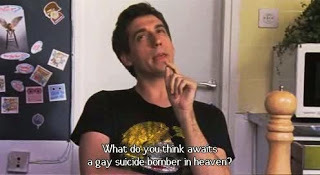
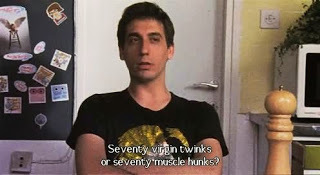
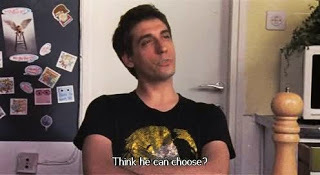 I love this 2006 Israeli film, The Bubble, by the great Eytan Fox. In fact, I love all his movies, such as Yossi and Jagger and Walk in Water. He is a master storyteller, where he can tell a story replete with political issues and make it human. Take for example, The Bubble. In the heart of it, it’s a love story, where the reality of their situation tears them apart, as one of them is a Jew and the other is a Palestinian, not to mention both are men. So, the film ends just like Mani Ratnam’s Dil Se did. Yet, there is so much humour and lightheartedness within this tragic premise.
I love this 2006 Israeli film, The Bubble, by the great Eytan Fox. In fact, I love all his movies, such as Yossi and Jagger and Walk in Water. He is a master storyteller, where he can tell a story replete with political issues and make it human. Take for example, The Bubble. In the heart of it, it’s a love story, where the reality of their situation tears them apart, as one of them is a Jew and the other is a Palestinian, not to mention both are men. So, the film ends just like Mani Ratnam’s Dil Se did. Yet, there is so much humour and lightheartedness within this tragic premise. Here, a gay man discusses the afterlife of Palestinian suicide bombers. “What do you think awaits a gay suicide bomber in heaven? Seventy virgin twinks or seventy muscled hunks? Think he can choose?”
/
The Bubble (Hebrew: הבועה HaBuah) is a 2006 romantic drama directed by Eytan Fox telling the story of two men who fall in love, one Israeli and one Palestinian. The title of the film refers to Tel Aviv, a relatively peaceful city in a tumultuous region and the setting of the film.
MORE HERE/
Published on January 12, 2015 23:15
Duvidha
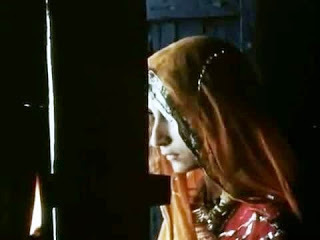
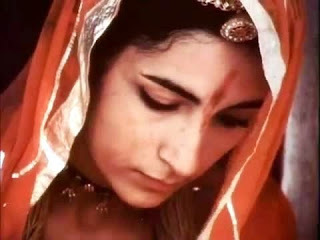
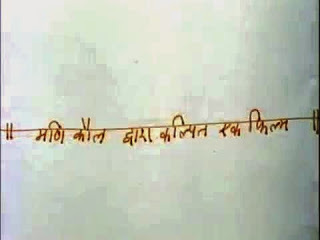
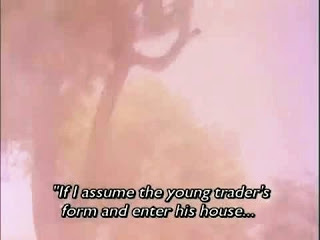
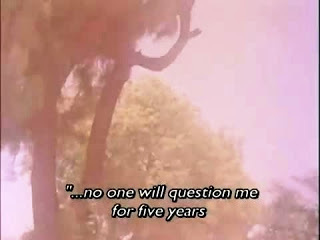
 The film is deathly slow. The visuals are grainy. The acting is awkward. The dialogue is delivery stilted.
The film is deathly slow. The visuals are grainy. The acting is awkward. The dialogue is delivery stilted. Yet, Mani Kaul’s Duvidha (1973) is so mesmerising that you cannot stop looking. There is Raisa Padamsee’s ethereal beauty, and there is story of a ghost who falls in love with a young bride, taken from Vijaydan Detha’s retelling of an old Rajasthani folk tale.
It is one of those movies that you are grateful that it exists. Amol Palekar’s Paheli is not a patch on it.
/
Duvidha is a 1973 Bollywood ghost movie directed by Mani Kaul. The film stars Ravi Menon and Raisa Padamsee in lead roles.The film was critically acclaimed and won the director National Film Award for Best Direction and Critics Award for Best film at the 1974 Filmfare Awards.
MORE HERE/
Published on January 12, 2015 04:16




